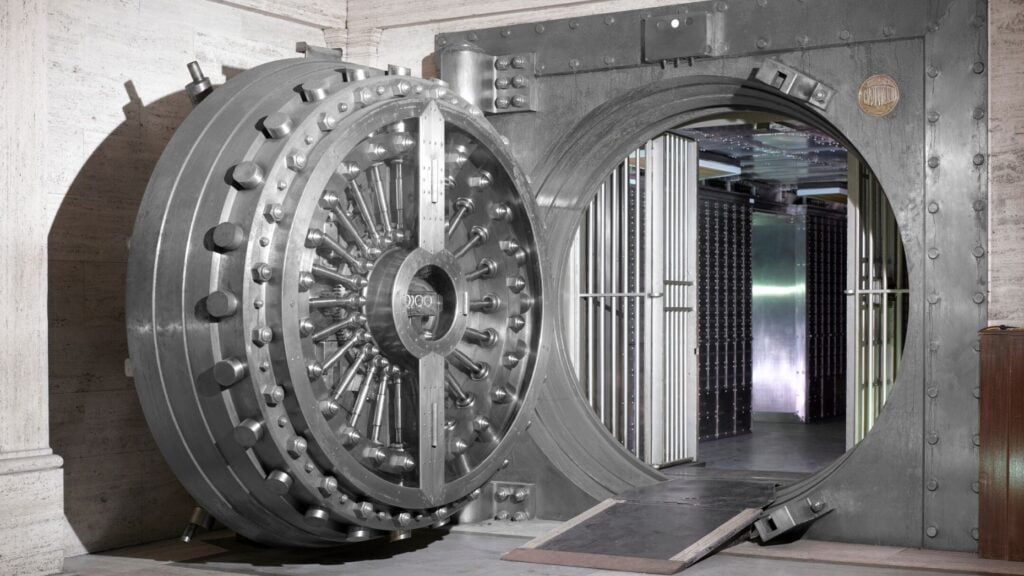The 1.5 million-member National Association of Realtors invited two Washington D.C. journalists to its midyear conference Tuesday morning to answer members’ most burning political questions.
Anna Palmer and Jake Sherman, co-founders of Punchbowl News — named after the U.S. Secret Service’s nickname for the Capitol — spoke during the general session of the Realtors Legislative Meetings in National Harbor, Maryland and took several questions from attendees.
Here are some of the topics and questions they covered:
How will the Supreme Court’s apparently imminent overturning of Roe v. Wade impact Congress?
Sherman: This election cycle vastly favors Republicans because of history, because of the economy, because of a whole host of factors. But I would imagine that Democratic candidates across the country today, organizations like Planned Parenthood, Emily’s List, some of the big progressive organizations that promote female candidates and abortion rights and reproductive rights, are going to get just flooded with contributions today, and it remains to be seen whether Democratic voters turn out in bigger numbers because of this.
Palmer: This is something that injects a lot of momentum among core Democratic voters. I think the real question is how does this play with some of the suburban voters, suburban women, in some of these key swing state races? Our center of gravity is Capitol Hill. This becomes an animating issue for the foreseeable future, certainly in terms of just members of Congress talking about it. What happens to the filibuster? This is that 60-vote threshold in the Senate that a lot of Democrats have been pushing to remove because they are frustrated by the divided government — that 50-50 Senate that we’re dealing with right now. Is this the issue that the chamber decides is imperative enough that they are going to end the filibuster?
Sherman: Early indications I was getting from sources this morning is no. Congress is not going to be able to stop this. But this … will alter the political landscape going into the next 189 days until the midterm elections.
How bad is it on Capitol Hill? How are the relationships between Republicans and Democrats right now?
Sherman: If you just think about the last 15 years on Capitol Hill, we’ve had two members of Congress shot. We’ve had a pandemic. We’ve had a violent attack on the Capitol with an attempt to alter the outcome of a presidential race. It’s never been this bad. The two parties basically don’t talk to each other anymore. They’ve actually put metal detectors throughout the Capitol around the House floor to make sure that nobody brings a gun into the House floor. We’ve had a member of Congress arrested last week for trying to bring a gun into the airport. Since 2008 we’ve gone through one massive recession. We’ve gone through now a two-year pandemic. It’s not surprising that both the populace and the people who represent the populace are frustrated and a little bit tart.
Palmer: Politics has become much, much more partisan, and a lot less agreements in the middle in terms of making deals. Members of Congress spend a lot less time in Washington. So there’s a lot less of … those friendly relationships that happen where you can say, “Hey, I know that guy on the other side of the aisle. You know, he’s not a bad guy, even though he doesn’t believe the same politics that I believe.”
Will the January 6 attack on the Capitol affect the midterms?
Sherman: I was in the Capitol on January 6. I have no doubt that it was a violent riot. I don’t know that it will have a massive political impact come November. I think people have made up their minds. Everybody that goes in front of the jury for a trial about January 6 is basically convicted. I think that you’re just going to see … a spectacle unlike anything anybody has ever seen in the next couple of months. Because the [January 6] committee beginning in June is going to hold primetime hearings on the January 6 attack, which is meant to try to build support for their findings, and that’s going to be much of the summer. They’re going to hold six or eight hearings over the next couple of months leading up to the election on that attack, the foundations of the attack, who funded it, who was involved in it. So it’s going to be a continuing narrative.
How does this Congress compare to its predecessors?
Sherman: Whether you think this Congress is useless or this president is useless or is doing a lot or doing a little, remember that he has basically no majorities, which is incredibly difficult. Anna and I have seen massive majorities, 30-seat majorities, accomplish less than this Congress has accomplished. That’s not to say whether these policies are good, bad or indifferent, but it’s about getting the majority to pass bills and it’s just incredibly difficult to do so with a sliver of a majority.
What motivates Mitch McConnell?
Palmer: I think it’s really simple. He is a political brawler, and he wants to win. He wants nothing more than to be the next majority leader. When you look at who he supports in terms of candidates, with the policies that he is trying to push forward, it is all about a return to the majority.
Sherman: In an era where the Republican Party has a lot of litmus tests about who supports or does not support President Trump, when you ask Mitch McConnell what he thinks of candidates who do or don’t support Trump, he says, ‘I don’t care who they support as long as they’re able to win.’ Mitch McConnell has not spoken to Donald Trump since before the attack on the Capitol. And if you’ve talk to people close to him, they basically say he would be fine with never speaking to him again. He has said he would support Donald Trump for president again.
Palmer: He has an R behind his name.
Sherman: [McConnell] is a conservative Republican who wants Republicans to win and believes the nation is better served by having Republicans in office.
Will Trump run again?
Sherman: He keeps his own counsel. The man has $150 million in his campaign account, unless he spent planning to spend money on somebody else, which I don’t think he is, I think he does run again.
Palmer: If you just look at the data points of the amount of money that he has raised, he still loves the campaign, to get out there, to be in the public eye, I think all of those things really go towards him wanting to run.
Will Biden run again?
Sherman: If he’s physically and mentally able, yes. I’m not saying that jokingly. This is a delicate topic for a lot of people, but our nation’s leadership is old. It’s not out of the realm of possibility to say that a man that’s 78 years old, the President of the United States, might have it tough. It’s not crazy to say he might want to do something else.
Palmer: It’s also a very, very different campaign. He was a man who was able to campaign basically by not doing six stops a day … because of the COVID. I think they clearly are trying to keep him in the mix as long as possible. He may choose to run again. I honestly think if Donald Trump runs, there’s a higher likelihood for Joe Biden.
Will the Supreme Court be expanded?
Sherman: It’s not going to happen. You need 60 votes to do anything in the Senate because of the filibuster. Democrats have 50 votes. You could blow up the filibuster with 50 votes. They refuse to do so. So I don’t see any possibility of blowing up the filibuster to expand the Supreme Court.
Palmer: But what I think is worth watching is that this idea has gotten a lot more steam in Democratic politics. So it’s worth just looking at it in terms of the totality of an arch. Maybe it’s a 10-year play? Maybe it’s a 30-year play.
What has caused this tremendous amount of acrimony in Washington D.C.?
Palmer: People are unhappy … with institutions in general in this country, and it’s not just Congress, it’s the media, it’s big business. All kinds of things. Right now if you are a conservative in the House you’re only worried about getting primaried by somebody who’s more conservative than you. If you’re a liberal, your only issue that you’re concerned about is that you’re gonna get primaried by somebody who’s more progressive than you. So there is literally no incentive to work across the aisle or to try to find places of commonality.
Sherman: The way we draw congressional districts in this country is completely broken. They’re drawn by partisan legislatures. You see these gerrymandered districts … That’s not a Republican issue or a Democratic issue.
That’s the first thing. The second thing is I fear this decision on abortion is going to make it worse in one respect. We’re going to have … conservatives in red states that are going to ban abortion and blue states that are going to allow it and people are going to flock to states where people think like them. Having people around you who only think the way you do is not necessarily a healthy thing for congressional districts, for democracy, and a whole host of things.
Email Andrea V. Brambila.
Like me on Facebook | Follow me on Twitter



 Are You Interested in West Eleventh Residences Miami?
Are You Interested in West Eleventh Residences Miami? Are You Interested in ONE Park Tower by Turnberry?
Are You Interested in ONE Park Tower by Turnberry? Are You Interested in Diesel Wynwood Condominium?
Are You Interested in Diesel Wynwood Condominium? Are You Interested in Five Park Miami Beach?
Are You Interested in Five Park Miami Beach? Are You Interested in Cipriani Residences Miami?
Are You Interested in Cipriani Residences Miami? Are You Interested in Bentley Residences Miami?
Are You Interested in Bentley Residences Miami? Are You Interested in Baccarat Residences Brickell?
Are You Interested in Baccarat Residences Brickell? Are You Interested in Aria Reserve Miami?
Are You Interested in Aria Reserve Miami? Are You Interested in 888 Brickell Dolce & Gabbana | Miami?
Are You Interested in 888 Brickell Dolce & Gabbana | Miami? Are You Interested in 600 Miami WorldCenter?
Are You Interested in 600 Miami WorldCenter? Are You Interested in HUB MIAMI RESIDENCES?
Are You Interested in HUB MIAMI RESIDENCES? Are You Interested in WALDORF ASTORIA RESIDENCES?
Are You Interested in WALDORF ASTORIA RESIDENCES?